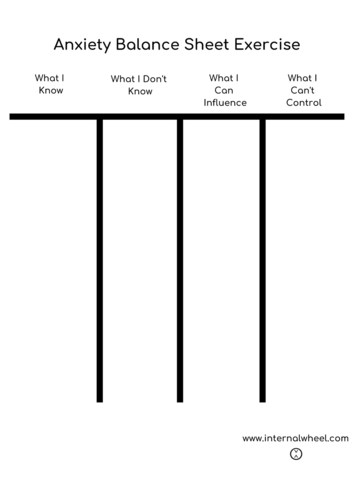
Chip Conley, writing for his Wisdom Well blog, has a great idea for mastering anxiety. If you've ever laid awake at night, fretting over something that was going to happen (or was even vaguely possible), you'd give almost anything to make the anxiety go away. Chip Conley presents a tool that might do just that.
Conley writes: "Almost all anxiety can be traced to two sources: ambiguity and a perceived lack of influence. I've found when anxiety strikes, I create a balance sheet of what I know and what I can influence. Anxiety lurks in the dark, so this balance sheet acts as an illuminating flashlight."
Now, I admit that the idea of creating a spreadsheet as therapy would never have occurred to me, but I do see the beauty in his idea. Here's what he proposes:
"Create four columns, as shown below and start listing everything you can think of under each heading. Maybe you're worried you're going to get laid off. In the first column, list everything you know about the company's and your performance. You can add what you don't know in column 2. Next, move to the powerlessness part of the equation by listing in column 3 how you can influence or control the situation, followed by what you can't control in column 4."

What I love about this idea most is that it's tangible. Writing down your thoughts helps stop the cycle of rumination, the endless loop of negative thoughts. It gets them out of your head and down onto paper. It's also a way to see clearly how many knowns and unknowns and how much power you have to influence events. If there are lots of things you can control, but just one thing you can't (like how your boss will feel about a presentation, or whether you'll be the best candidate for a job) you might be able to rest easier.
It's also a productive exercise that gets your brain going in a straight line instead of around in circles. When I am stressed about how much there is to do, I find that getting up and making lists calms my brain enough to let me sleep. Many people journal to help them get over negative emotions. This would make a very effective sort of journal entry.
Chip Conley calls this an "emotional accounting lesson." And he suggests you could do it with others: your partner, as you're worrying about a big decision. Or your team at work as you're going through a crisis.
This method is a great corollary to my husband's theory on worry. (He's not a fan of it.) When he catches me laying awake in the night fretting, he always asks "Is there anything you can do about it right now?" (with a pointed look at the clock reading 2 AM.) "If the answer is no, go back to sleep. Getting a good night's sleep is one thing you can do right now to make it better."
For the record, sweetheart, you're right. I've got a spreadsheet that proves it.

